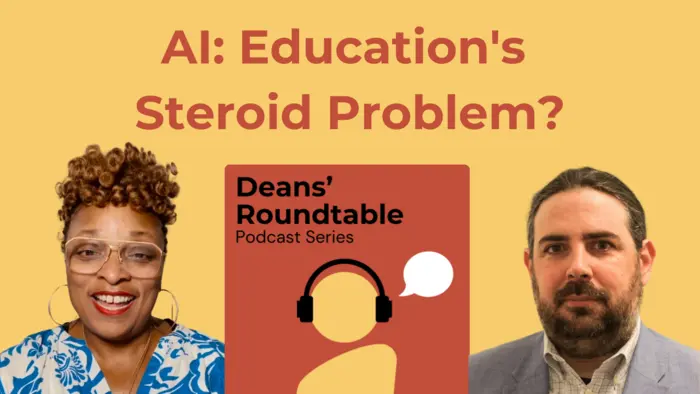AI Academic Integrity Policies: Expert Insights for Schools
I recently had a conversation with Derek Newton, a leading voice on academic integrity in education and publisher of the Cheat Sheet newsletter. As independent schools grapple with establishing effective AI policies, Derek offers valuable perspective on departmental approaches, student involvement, and the critical balance between academic growth and integrity.

The State of Academic Integrity Today
Cheating has always existed in education, but as Derek notes, “what is new now is online and remote education.” The expanded distance between educators and students creates more opportunities for misconduct.
“The greater that distance, whether it’s real or perceived,” Derek explains, “invites opportunity for misconduct.” This distance can be literal, such as with remote learning, or figurative, when students feel disconnected from the educational process.
Another concerning factor is our evolving view of education as a commodity rather than a learning journey. “More and more people are less interested in the learning journey than they are about getting the grade, the degree,” Derek observes. “If you’re in school to get the degree, what you do to get there matters less. If you’re in there to actually learn, then you wouldn’t cheat because you are not learning when you’re cheating.”
Departmental Approach to AI Policy
When it comes to creating AI policies, Derek advocates for a departmental approach rather than one-size-fits-all rules. AI has different applications and benefits across subject areas:
“It has different uses depending on different subject matters. If it’s physics or calculus, it has value… If it’s English composition or literature, what it can do for the student, good and possibly bad, are different.”
This flexibility allows for more nuanced guidelines that can even vary by assignment:
“I don’t mind if you use AI while you’re doing the reading, maybe to summarize or rephrase, especially if you have language or reading challenges, but when it comes to your writing, that’s a no-no. I want to know what you think and what your level of communication and writing is.”
For administrators worried about the complexity of varied policies, Derek emphasizes clarity as the key factor: “As long as you are beyond clear about what is and isn’t inbound, I think it should vary.”
The AI and Steroids Comparison
One helpful analogy Derek shares compares AI to performance-enhancing drugs in sports:
“If you are in an academic setting focused on measuring outcomes and performance—like how good is the essay, what is the quality of writing—AI is going to really cloud that, similarly to if you were having a track and field competition and allowed some participants to use steroids.”
The question becomes: What are we actually measuring? “Did you measure skill? Did you measure preparation, or did you measure who could use the drugs best? You need to be clear about what you’re trying to measure.”
This comparison helps frame the different contexts for AI use. While Derek fully supports AI in professional settings (“somebody who can cut down their workflow time on projects by 40, 60%, 90%—go for it”), he sees greater concerns in academic environments where assessment is the goal.
Teacher Use of AI
For educators, AI offers significant efficiency benefits. Teachers can use AI to:
- Pull in and convert resources
- Generate lesson plans that hit specific learning objectives
- Create assessments aligned with curriculum goals
The key difference is expertise: “If you’ve taught this subject before and you’re a subject matter expert, what the AI offers you is going to be informative, but you’re going to be able to say, ‘No, I don’t want to do that’ or ‘That’s a good idea.'”
Derek expresses less concern about teacher use of AI, provided there’s appropriate oversight: “As long as there’s oversight from program chairs and deans related to quality, I think that’s just good professional conduct.”
Student Involvement in Developing AI Policies
Students have valuable insights to offer in creating effective AI policies. Derek notes that “they tend to be well ahead of their teachers on what technologies and tools are available, and how their peers are using them.”
One suggestion is to create anonymous forums where students can share information about tools and shortcuts without fear of consequences. This approach acknowledges the reality that within the first minutes of a course, “one or two students set up group chats” that can become “perfect breeding grounds for misconduct.”
One professor Derek interviewed joined these student group chats, finding it “really informative from a teaching perspective, to see what students got hung up on, what they thought was a waste of time.” This approach allowed the professor to both improve teaching and address cheating proactively.
Responding to Academic Integrity Violations
When it comes to consequences for improper AI use, Derek suggests a graduated approach:
- First offense: “I’m going to reassess you. We’re going to have an oral examination, or you’re going to write by hand in front of me.” This focuses on determining what the student actually knows.
- Repeated offenses: “The second time with the same student, I might say we had this issue already and need to exert some sort of more stringent consequence—a zero on the assignment, maybe an overall grade reduction.”
Derek also highlights innovative approaches like a “take back” policy, where students can withdraw a submitted assignment within 48 hours, receiving a zero but avoiding misconduct proceedings. One school found 10% of assignments were withdrawn under this policy—cases they would have otherwise had to address as misconduct.
Consistency in Enforcement
For administrators hesitant to enforce academic integrity policies strongly, Derek acknowledges the disincentives: “These cases are expensive, time-consuming, confrontational, and carry risk of embarrassment.”
However, he advocates for consistency for two key reasons:
- Student awareness: “Students talk to each other and they know when somebody got caught and wasn’t really punished. This takes away a deterrent factor in future cheating.”
- Teacher morale: “When administrators are more passive or more lenient, it really demoralizes the teachers because the emotional labor and investment it takes to initiate a case in the first place is quite high.”
From a legal perspective, consistency is also crucial: “If you are inconsistent in your application of consequences or how you weigh evidence, judges are much more inclined to tell you how you should have done it.” Clear, consistently applied policies provide the strongest legal protection.
The Future of AI in Education
Looking ahead, Derek believes technology (including AI) will increasingly challenge our confidence in online education: “I think it’s going to be increasingly more difficult to teach and give assessments online. The technology is too malicious, too common, for schools to keep up with it.”
New challenges like “agentic AI” that can complete entire courses without human intervention and technology that can manipulate eye-gaze during video calls will further complicate remote assessment.
The silver lining? “Awareness of academic integrity is increasing rapidly. People are starting to look for it more often, take it more seriously, engage with it as something that needs attention.” This growing awareness is the first step toward developing more effective approaches.
Practical Guidelines for AI Citation
When students appropriately use AI, proper citation is important. Derek recommends including:
- The type of AI used (ChatGPT, Claude, etc.)
- When it was accessed (date and time)
- The prompt used to generate the content
- Clear indication of how the AI-generated content was incorporated
Resources for Independent Schools
For independent schools looking to develop or refine their AI academic integrity policies, Derek’s newsletter “The Cheat Sheet” provides ongoing insights and updates in this rapidly evolving field.
As we navigate these challenging waters, the key is finding the right balance: embracing AI’s benefits while maintaining educational integrity and ensuring students develop the critical thinking and creative skills that technology cannot replace.
Bridget Johnson, Founder, Deans' Roundtable
Want more support as a student life professional?
Look no further than the Deans' Roundtable Community
- Network with a vast directory of student life professionals like yourself
- Gain a multitude of professional development opportunities to be the best version of yourself
- Gather expert advice on the important questions you need answered

